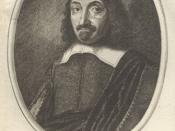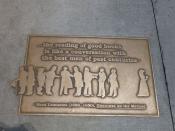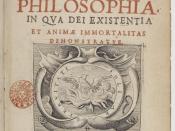In Meditation I, Descartes is questioning reality and seeking the truth. He states in his introduction that everything he knows is wrong and he decides to attack the foundations of all his beliefs. To do this, he overthrows all his beliefs and sets forth with a blank slate. Descartes argues with himself about whether or not he can trust his senses, whether even mathematical truths are real, and the existence of God. The argument I will criticize is his argument that we shouldn't trust our senses.
Descartes first argument involves whether he can trust his senses. He says that all we have learned has come to us through our senses. He states that even in dreams he is fooled by his senses into thinking he is awake. He goes on to say, "The things I see in sleep are like painted images which must have been patterned after real things..."
I agree with this statement, there are not things in my dreams which aren't somehow based on reality or something I've seen on television. While I agree that the senses can deceive a person, I think we have to trust them; life would be even more difficult if we didn't. If we did not trust our senses, we wouldn't be able to trust the expression on people's faces and the tone of their voice when they spoke.
Descartes says that, "I see so plainly that there are no reliable signs by which I can distinguish sleeping from waking..." In lucid dreams, however, the person who is asleep knows they are dreaming and can do things in their dreams that would be impossible if they were awake, such as flying. In class, John Stahl said he was able to ride a sled up a hill and defy gravity in his...


